
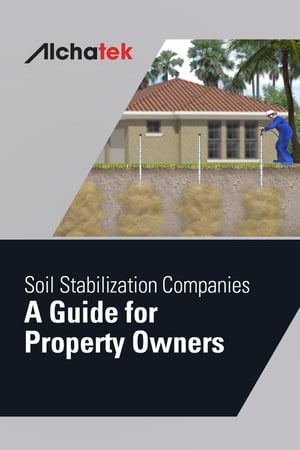 If you're searching for a soil stabilization company, you've probably noticed signs of unstable soil around your property, such as cracks or sinking in your patios, walkways, or pool decks. Unstable soil can lead to serious structural issues, but the right soil stabilization contractor can provide a lasting solution. Understanding the soil remediation process is an essential prerequisite for accurately evaluating soil stabilization companies.
If you're searching for a soil stabilization company, you've probably noticed signs of unstable soil around your property, such as cracks or sinking in your patios, walkways, or pool decks. Unstable soil can lead to serious structural issues, but the right soil stabilization contractor can provide a lasting solution. Understanding the soil remediation process is an essential prerequisite for accurately evaluating soil stabilization companies.
Common Causes of Unstable Soil
Over time, the soil around your home can become unstable due to several factors. For instance, erosion from poor drainage or leaky pipes can weaken the soil. Additionally, the settling of poorly compacted fill dirt used during construction can cause issues. Furthermore, damage from repeated freeze-thaw cycles can degrade the soil's stability. Finally, the decay of buried organic material like tree stumps or construction debris can create voids and instability.
When soil becomes unstable, it can no longer properly support the weight of concrete slabs, leading to cracks, sinking, and other problems. As a result, it's important to address soil instability promptly.
The Soil Stabilization Solution
Fortunately, unstable soil can be repaired through a process called structural polymer injection. In this method, a contractor injects an eco-friendly polymer into the ground, which fills voids, binds loose soil, and creates a solid, stable base. The polymer material used in this process is designed to be long-lasting and resistant to future soil erosion. Structural polymer injection is a minimally invasive technique that can be completed quickly, allowing you to enjoy a stable foundation without significant disruption to your property.
What to Look For in Soil Stabilization Companies
Polymer injection requires specialized equipment and expertise, so this isn't a DIY job. When hiring a contractor for soil stabilization, there are several key factors to consider. First, look for proven experience and expertise in soil stabilization. Second, check for positive client testimonials and references. Additionally, they should provide a thorough property evaluation and customized injection plan. Furthermore, they should offer detailed project estimates with clear costs and timelines. Finally, make sure they use soil stabilization polymers that are NSF-certified to meet strict environmental standards.
The right professional will be a partner who understands your specific needs and delivers long-lasting results. By choosing wisely, they will stabilize your soil properly, protecting the structural integrity of your concrete slabs.
Find a Soil Stabilization Contractor Today!
If you suspect soil instability around your home, don't delay. Instead, contact an experienced soil stabilization contractor for an assessment. Their specialized knowledge and quality materials ensure a lasting solution, giving you peace of mind and a safer home for years to come. So, take action today to protect your most important investment - your home.
Fill out this form or call 404-618-0438 for a contractor referral today!



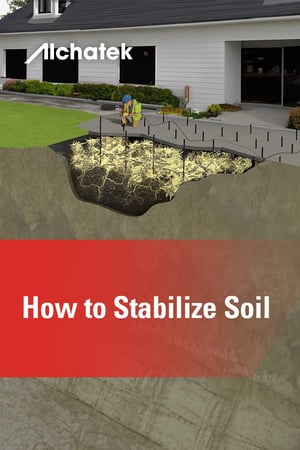 If you've noticed cracks or sinking in your patios, walkways, pool decks, or other slabs, the problem may lie beneath the surface. In fact, unstable soil around your home can lead to serious structural issues. But don't panic - there is a lasting solution. Keep reading to learn more about how to stabilize soil.
If you've noticed cracks or sinking in your patios, walkways, pool decks, or other slabs, the problem may lie beneath the surface. In fact, unstable soil around your home can lead to serious structural issues. But don't panic - there is a lasting solution. Keep reading to learn more about how to stabilize soil.
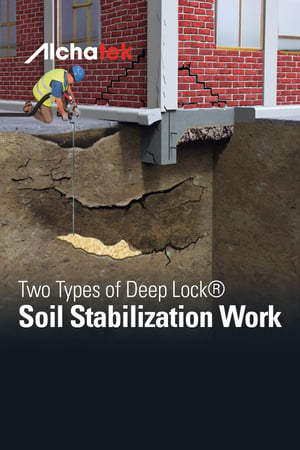 Deep Lock® is an innovative process developed by Alchatek that utilizes high-quality structural polymers to address deep soil issues. This powerful, painless, and rapid solution stabilizes soil at all levels, ensuring long-lasting results with minimal disruption to the property. This article profiles the two main types of Deep Lock® soil stabilization work and the specific situations in which each type is most effective.
Deep Lock® is an innovative process developed by Alchatek that utilizes high-quality structural polymers to address deep soil issues. This powerful, painless, and rapid solution stabilizes soil at all levels, ensuring long-lasting results with minimal disruption to the property. This article profiles the two main types of Deep Lock® soil stabilization work and the specific situations in which each type is most effective.

 Essential Details
Essential Details

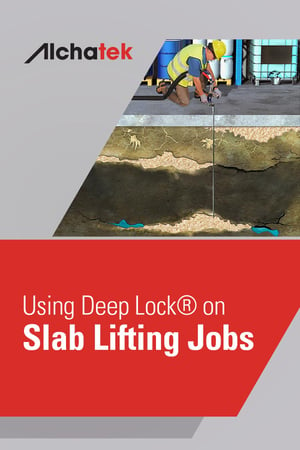 While Alchatek's Deep Lock® process is primarily used on deep soil stabilization jobs, there are specific situations in which deep soil stabilization may be needed to reinforce soil on slab lifting jobs. In cases where slabs are bearing heavy loads, have significantly loose soil underneath, or are located in areas where access is limited, incorporating the Deep Lock® process can help address the underlying soil stability issues. With the addition of the Deep Lock® soil stabilization process, contractors can achieve effective, minimally invasive slab lifting results while simultaneously improving the long-term stability of the foundation.
While Alchatek's Deep Lock® process is primarily used on deep soil stabilization jobs, there are specific situations in which deep soil stabilization may be needed to reinforce soil on slab lifting jobs. In cases where slabs are bearing heavy loads, have significantly loose soil underneath, or are located in areas where access is limited, incorporating the Deep Lock® process can help address the underlying soil stability issues. With the addition of the Deep Lock® soil stabilization process, contractors can achieve effective, minimally invasive slab lifting results while simultaneously improving the long-term stability of the foundation.




 Essential Details
Essential Details
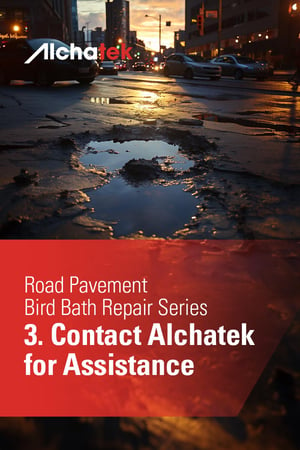 Before embarking on any bird bath repair project using the Deep Lock® process, it's crucial to consult with industry specialists. The Alchatek support team, with extensive experience in advanced pavement repair techniques, offers invaluable insights for assessing site conditions, choosing appropriate materials, and implementing effective repair strategies.
Before embarking on any bird bath repair project using the Deep Lock® process, it's crucial to consult with industry specialists. The Alchatek support team, with extensive experience in advanced pavement repair techniques, offers invaluable insights for assessing site conditions, choosing appropriate materials, and implementing effective repair strategies.
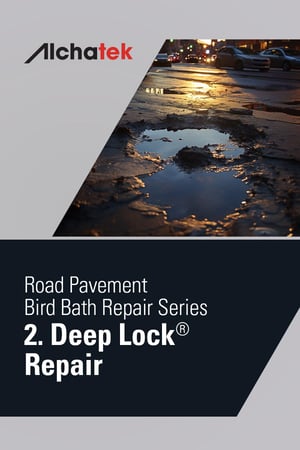 In the previous post, the causes and consequences of bird baths in road pavement were explored. Now, attention will turn to an innovative solution for repairing these issues: the Deep Lock® process.
In the previous post, the causes and consequences of bird baths in road pavement were explored. Now, attention will turn to an innovative solution for repairing these issues: the Deep Lock® process.
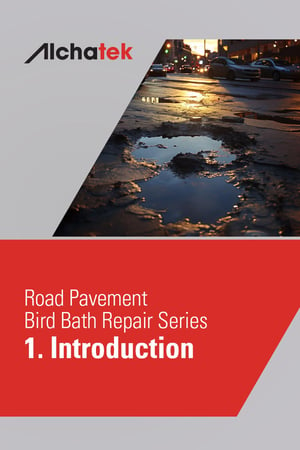 Have you ever noticed shallow, pond-like formations on the surface of roads, particularly in private neighborhoods, subdivisions, or parking lots? These are known as "bird baths" in the road surface, and they're more than just a quirk of the road. They signify deeper issues in road maintenance and safety that are crucial to address.
Have you ever noticed shallow, pond-like formations on the surface of roads, particularly in private neighborhoods, subdivisions, or parking lots? These are known as "bird baths" in the road surface, and they're more than just a quirk of the road. They signify deeper issues in road maintenance and safety that are crucial to address.